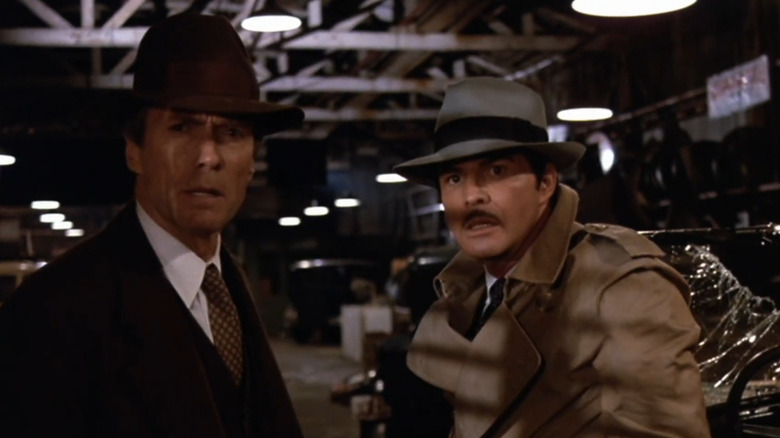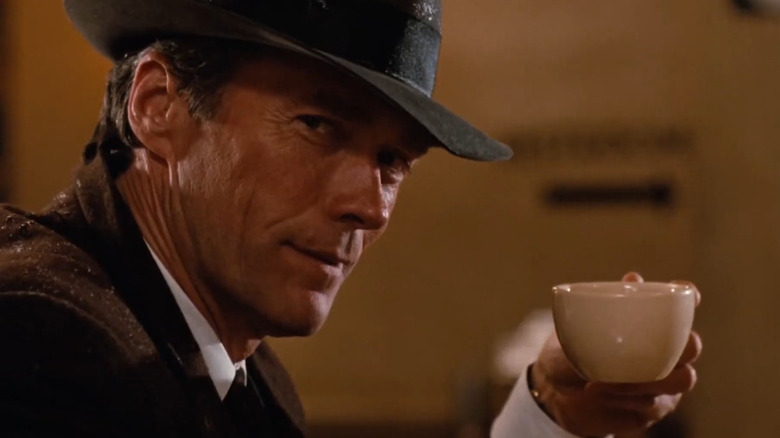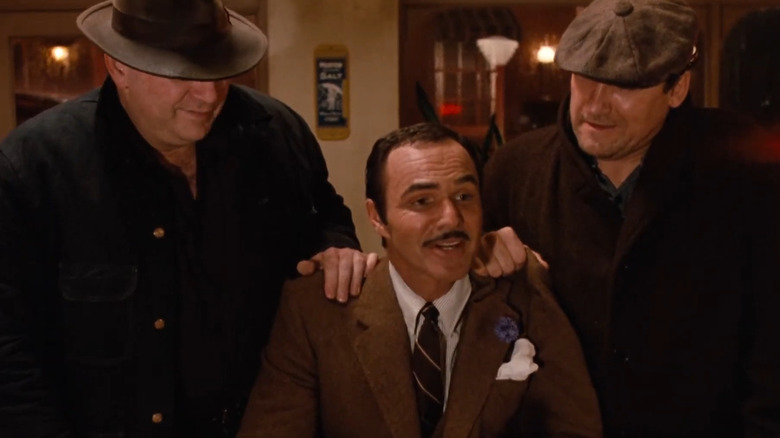Why Burt Reynolds Regretted His Gangster Movie Flop With Clint Eastwood
Bringing two movie stars together to do a buddy action flick has been one of Hollywood's greatest traditions. The appeal of these movies is watching personalities butt heads with each other until differences lead to a genuine comradery in the end. "48 Hrs," "Lethal Weapon," "Hot Fuzz" and "The Nice Guys" are but a few examples of the kinds of chaotic screen duos that we still talk about today. You would think that a gangster buddy flick starring Clint Eastwood and Burt Reynolds would be more fondly remembered, but it currently exists as an oddity that never took off in the way either of them wanted it to.
On paper, the 1930's-set "City Heat" sounds like a fun idea. Eastwood plays Speer, a Kansas City police Lieutenant who finds himself in quite a predicament when Reynold's Mike Murphy, a cop turned private eye, waltzes back in his life. The gist is that they actually used to be friends, having served on the same police force at one point. The pair drifted apart in the years since their work life separation, but have been brought together under unusual circumstances involving a suitcase with some important documents, the death of Murphy's partner, and a mutual affection for Jane Alexander.
In 1984, Eastwood was just coming off of directing/starring in "Sudden Impact" and "Tightrope," while Reynolds was last seen in "The Man Who Loved Women" and "Cannonball Run II." Each actor was at different stages in their career, but they both had considerable hits to their name to invest in a project like this. "City Heat" was also loaded with a great selection of characters actors like Richard Roundtree, Madeline Kahn, Rip Torn and frequent David Lynch collaborator Jack Nance.
In spite of having everything going for it, "City Heat" was both a box office and critical disappointment across the board, with the film earning $38.3 million on a $25 million budget. "How do travesties like this get made," says Roger Ebert in his scathing review. Gene Siskel was even harsher, giving it no stars at all. And star Burt Reynolds wasn't happy with the movie, either. You would think that Reynolds' disappointment with the finished film would stem from any one of these results, but it actually lies in something a bit sadder.
Burt Reynolds knew City Heat was going to be his one shot to work with Clint Eastwood
Reynolds's greatest regret with making "City Heat" was how it ensured that he would never get another chance to collaborate with Eastwood. "It's regrettable the material wasn't there, because Hollywood or maybe just Warner Bros. will never let Clint and I act together again," lamented Reynolds in his profile for the Los Angeles Times. It came as a real disappointment to him that they couldn't make their pairing work especially since the "Smokey and the Bandit" star saw parallels between their careers and how the audience perceives them (via MeTV).
It's never a great sign for one of your lead actors to have a bad feeling about the movie they're currently making, but Reynolds spoke about how he had an inclination that he was going to take the rap for the failure of "City Heat" only ten days into production (via Los Angeles Times):
"Clint was playing formula Clint that always worked for Clint. I was playing Jack Lemmon in this strange film where people were getting blown away. I never read a review of the film, because I knew I was going to get killed by the critics."
It's a shame they couldn't get things on track because Eastwood and Reynolds already shared common ground. Both actors made a name for themselves on television westerns in starring roles prior to their film careers taking off, with "Rawhide" and "Gunsmoke" respectively. Reynolds notoriously attempted to get into the spaghetti western game after seeing how it catapulted Eastwood to movie stardom. But a Sergio mixup, however, led to one of his worst films with "Navajo Joe."
Reynolds seemed to have taken the failure of "City Heat" to heart, but the truth is that the film was already in enough trouble before the cameras ever started rolling.
City Heat was in disarray before cameras started rolling
"City Heat" initially got its start as "Kansas City Jazz," a screenplay treatment written a decade prior by writer/director Blake Edwards. You'll likely recognize that name as the filmmaker behind the Peter Sellers "Pink Panther" movies, "Breakfast at Tiffany's" and "Victor/Victoria." Edwards was going to direct it, but was ultimately fired from the project and replaced with actor/director Richard Benjamin. Eastwood likes working with people he knows he could get to play ball with. His creative differences, however, often lead to getting people booted from projects he's a part of, mostly notably with Philip Kaufman's exit from directing "The Outlaw Josey Wales."
Even Reynolds could see the writing on the wall with Edwards and Eastwood's clashing (via Los Angeles Times):
"Warner Bros. really wanted to make the film. I think they thought like I did that it would be one of those pictures which would look great in the catalogue...Clint likes a director he gets along with, which makes a lot of sense to me...Blake's dismissal hurt him badly. I don't think he's ever gotten over it."
Edwards kept his co-writing credit alongside "Sudden Impact" screenwriter Joseph Stinson, but did so under the pseudonym Sam O. Brown, a cheeky reference to his 1981 dark comedy "S.O.B."
When "City Heat" actually did reach the production stage, Reynolds fractured his jaw after a stuntman accidentally hit him a bit too hard in the face with a metal chair (via Far Out Magazine). It was clear that this project wasn't going to be easy, nor would it amount to a new buddy movie audiences would rush out to see.
"City Heat" has its followers, but it was clear to critics and audiences that the film was a tonal mess that attempted to merge a particularly unfunny buddy comedy out of a less than thrilling gangster noir. The trailer for "City Heat" ends with "need we say more" after the prominent billing of its movie stars. As Reynolds feared, it was the only movie he ever made with Eastwood.


